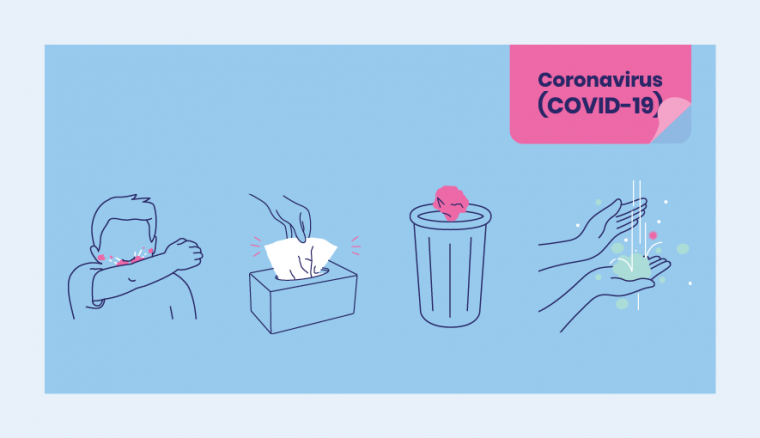What is the Full Form of Coronavirus?

Coronaviruses are a type of virus. There are many different kinds, and some cause disease. A newly identified type has caused a recent outbreak of respiratory illness now called COVID-19 that started in China.
Lauren Sauer, M.S., the director of operations with the Johns Hopkins Office of Critical Event Preparedness and Response and director of research with the Johns Hopkins Biocontainment Unit, shares information about COVID-19 and what you need to know.
How is COVID-19 spread?
Recent information indicates COVID-19 may be passed from person to person. Community spread is being seen, also. Community spread means people have been infected with the virus in a particular area, including some people who are not sure how or where they became infected. COVID-19 has been detected in people throughout China and in over 100 other countries, including the United States.
The spread of this new coronavirus is being monitored by the Centers for Disease Control (CDC), the World Health Organization and health organizations like Johns Hopkins across the globe. On Jan. 30, the World Health Organization declared the COVID-19 outbreak a public health emergency.
How did this new coronavirus spread to humans?
COVID-19 appeared in Wuhan, a city in China, in December 2019. Although health officials are still tracing the exact source of this new coronavirus, early hypotheses thought it may be linked to a seafood market in Wuhan, China. Some people who visited the market developed viral pneumonia caused by the new coronavirus. A study that came out on Jan. 25, 2020, notes that the individual with the first reported case became ill on Dec. 1, 2019, and had no link to the seafood market. Investigations are ongoing as to how this virus originated and spread.
What is the incubation period for COVID-19?
It appears that symptoms are showing up in people within 14 days of exposure to the virus.
What are symptoms of COVID-19?
COVID-19 symptoms include:
In rare cases, COVID-19 can lead to severe respiratory problems, kidney failure or death.If you have a fever or any kind of respiratory difficulty such as coughing or shortness of breath, call your doctor or a health care provider and explain your symptoms over the phone before going to the doctor’s office, urgent care facility or emergency room.
Over the phone, be sure to tell them if you have traveled outside the country in the last 14 days, particularly to countries affected by COVID-19 (currently China, Iran, Italy, Japan and South Korea). Also, be sure to tell them if you suspect you have been close (within 6 feet) of someone who has COVID-19 for an extended period.
Coronavirus (COVID-19) health alert
The World Health Organization has announced that COVID-19 is a pandemic. Find out how we are monitoring and responding to the outbreak, how you can help slow the spread of COVID-19 in Australia, and what to do if you have symptoms. We also report the latest official medical advice and case numbers.
How to protect yourself and others
Everyone must practise good hygiene to protect against infection and prevent the virus spreading.

Basic protective measures against the new coronavirus
Stay aware of the latest information on the COVID-19 outbreak, available on the WHO website and through your national and local public health authority. Most people who become infected experience mild illness and recover, but it can be more severe for others. Take care of your health and protect others by doing the following:
Wash your hands frequently
Regularly and thoroughly clean your hands with an alcohol-based hand rub or wash them with soap and water.
Why? Washing your hands with soap and water or using alcohol-based hand rub kills viruses that may be on your hands.
Maintain social distancing
Maintain at least 1 metre (3 feet) distance between yourself and anyone who is coughing or sneezing.
Why? When someone coughs or sneezes they spray small liquid droplets from their nose or mouth which may contain virus. If you are too close, you can breathe in the droplets, including the COVID-19 virus if the person coughing has the disease.
Avoid touching eyes, nose and mouth
Why? Hands touch many surfaces and can pick up viruses. Once contaminated, hands can transfer the virus to your eyes, nose or mouth. From there, the virus can enter your body and can make you sick.
Practice respiratory hygiene
Make sure you, and the people around you, follow good respiratory hygiene. This means covering your mouth and nose with your bent elbow or tissue when you cough or sneeze. Then dispose of the used tissue immediately.Why? Droplets spread virus. By following good respiratory hygiene you protect the people around you from viruses such as cold, flu and COVID-19.
If you have fever, cough and difficulty breathing, seek medical care early
Stay home if you feel unwell. If you have a fever, cough and difficulty breathing, seek medical attention and call in advance. Follow the directions of your local health authority.
Why? National and local authorities will have the most up to date information on the situation in your area. Calling in advance will allow your health care provider to quickly direct you to the right health facility. This will also protect you and help prevent spread of viruses and other infections.
Stay informed and follow advice given by your healthcare provider
Stay informed on the latest developments about COVID-19. Follow advice given by your healthcare provider, your national and local public health authority or your employer on how to protect yourself and others from COVID-19.
Why? National and local authorities will have the most up to date information on whether COVID-19 is spreading in your area. They are best placed to advise on what people in your area should be doing to protect themselves.
Protection measures for persons who are in or have recently visited (past 14 days) areas where COVID-19 is spreading